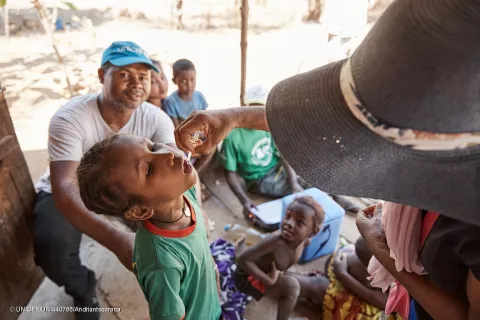Vaccination in the village does not tire the baby, with a long walk to the health centre
Volasoa is among the mothers who brought their children to be vaccinated during the advanced strategy carried out in her village Analabe. She highlights the usefulness of advanced strategies for immunizing children in remote villages.

Volasoa Fanjanirina NOMENJANAHARY, 23, is the mother of three boys aged 6, 3 years and 2 months respectively. Living in the village of Analabe, located 10 kilometres from the health centre (CSB2) in Fihaonana (Ankazobe health district, Analamanga Region), she was the first one to come to the advanced strategy site in Analabe on 29 June, 2021 to vaccinate her youngest son called Mamisoa Florent NOMENJANAHARY.
“Due to the distance from the health centre, I had to give birth in the village with the help of a matron even though I had received antenatal consultations at the health centre during my pregnancy. I had to wait until Mamisoa was 2 weeks old before I take him to the health centre to receive his first vaccines that he should have received at birth. We had to walk for two hours each way to reach the health centre; the baby was very tired,” says Volasoa.
Subsequently, she rushed to take her son to the vaccination site on the day when the implementation of the advanced strategy took place in Analabe. “His initial appointment for the first round of vaccination was scheduled for 23 June. But, when I remembered how very tired my baby was during the long walk, I hesitated to take him and preferred to wait until I had more financial means to pay the transportation fees. I was very happy to see the vaccinators come to us. In addition, the baby will not have to be shaken for four hours. Like his brothers, he will be protected against serious illnesses,” she rejoices.
Indeed, Volasoa is convinced of the benefits of the complete vaccination of children, in compliance with the vaccination schedule and during each vaccination campaign, thanks to the health observation of her first two boys. She says: “My eldest son Fanantenana, 6 years old, has only been ill once. In 2019, he contracted measles during the measles epidemic. But since he had already been vaccinated, the disease was easy to treat. My second boy, Henintsoa who is 3 years old, has not until now fallen ill. I believe vaccines boost their immunity.”
The head of the Expanded Program on Immunization (EPI) within the Fihaonana health centre (CSB2), Mr Lantonirina RAKOTOMANANA, reported that all the advanced strategies for the catch-up routine vaccination and vitamin A supplements carried out by the Fihaonana health centre (CSB2) on 28-29-30 June, 2021 during the vaccination campaign, in response to the polio epidemic made it possible to reach 115 children who were not completely vaccinated.
Thanks to the funds received from the American government, UNICEF Madagascar provided all the vaccines, inputs, management and communication tools for the 15 target regions of this integrated campaign held on 28-29-30 June, 2021. UNICEF Madagascar also supported community awareness raising by mobilizers, as well as the implementation of advanced and mobile strategies for catching up with routine immunization and vitamin A supplementation.





